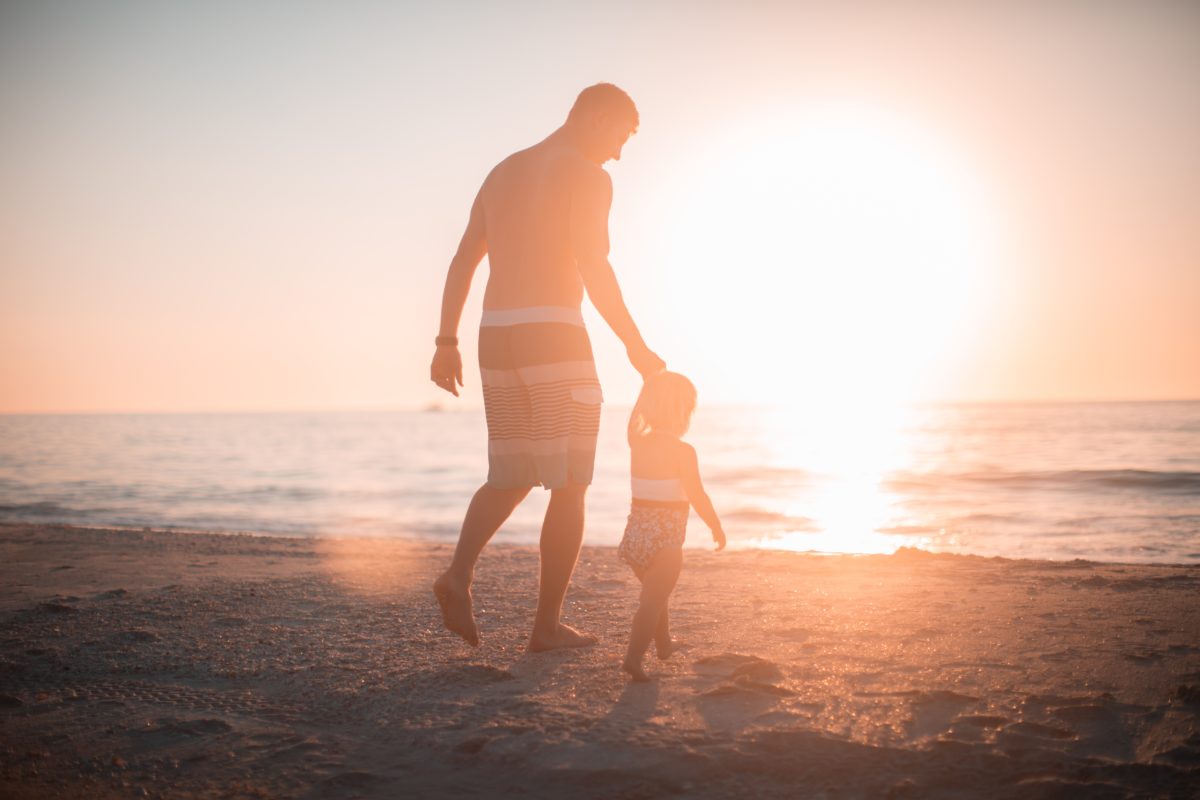I would venture to say that many fathers, just like I was, are not aware of the needs of their children in the different seasons of life. As they say, there’s no formal school for parenting and all the more so, on how to be a father. So many fathers probably do not know that if specific types of input are not given during specific periods of time in a child’s development, their child will grow up with deficiencies that might impact him for the rest of his life. Not knowing any better, fathers like me have inflicted father wounds on our children unintentionally.
I used to be clueless about this myself. I grew up without a father during the first 13 years of my life. So I didn’t have a good idea of what a good father is like during those formative years. But by God’s grace, my wife and I got much-needed help by attending parenting seminars, reading Bible-based books about parenting (The New Dare to Discipline by Dr. James Dobson, Shepherding A Child’s Heart by Tedd Tripp, Age of Opportunity by Paul David Tripp and How To Win Your Child’s Heart by Dr. Ruth Chang) and seeking the help of godly mentors, especially when our two sons (AJ, 18 y.o. and Ryan, 16 y.o.) were younger.
The challenge in being an intentional father is in continually learning how to be one. You never stop being a father to your son or daughter. Success in a certain season does not guarantee easier fathering in the teenage years. So I thank God that in 2015, I was able to attend “The World Needs a Father”, a training program based on the book of the same title by Cassie Carstens. My journey to becoming a more intentional dad got a much-needed shot in the arm.
I learned from our mentor Cassie that a father is a life coach, so I must understand life. Not only must I understand the enormous impact that I as a father have on my children in the home phase (0-11 years old) of their lives, but also the development process in every single year of their lives and what I need to do in these years.
Life has different seasons. God designed us to grow in a particular way, and we need to be molded by people – “seasonal potters of the clay” – who fulfill specific roles during the different seasons of our lives. As Cassie wrote:
This influence leaves fingerprints on our whole being (emotional, social, intellectual, physical and spiritual), and when those fingerprints are absent or tarnished, wounds are left that cause scars which show up later in many different and often unexpected ways.
For instance, being raised by a wonderful mother may lessen the pain of having an absent or abusive father, but without the necessary father-fingerprints on a son or daughter, a child will still experience struggles specific to the lack of molding in his life.
Although there is a primary influencer for each season in life, both father and mother are important throughout the child’s life. The secondary influencer’s priority should be to validate the input of the primary influencer in each phase.
Who are these seasonal potters of the clay?
During the mother-impact years from a child’s birth up to 5 years old, mom is the primary influencer. This does not mean that the father is not important, but mothers are the primary developers and have the most essential role to play at this stage. As the primary influencer, mom should be the one to nurture and comfort and embrace the child within a secure emotional environment. But the father should validate the inputs of the mom. So at this stage, I partnered with my wife in taking care of the babies, talking to them while still in the womb; when they were born, helping change their diapers and putting them to sleep; and when they were older toddlers, reading to them before bedtime, teaching them obedience when they could already understand, and training them in age-appropriate tasks.
The first father-impact phase is from 6 to 11 years. The father now becomes the primary potter in this season in a child’s life. Let me write more at length about this stage.
As a life coach, one important role the father has to play concerns the development of his child’s identity. At this stage, the father has to affirm the strong capacities of his child—the good things that he does and his unique significance – and to teach him basic life skills. A father’s affirmation is absolutely essential so as not to leave the child with uncertainties for the rest of his life. Therefore, a father has to discover where his child is gifted at, know his or her strengths and weaknesses—areas to be nurtured.
At this stage, I intentionally exposed our sons to sports clinics and music classes, even taking archery classes with them when they showed interest in it. In the process, I discovered that our older son was a natural archer, winning second place in his first competition. He has also become adept in playing the guitar since taking classical guitar lessons when he was younger.
So the child moving with the father, the child talking to the father, the father spending time with the child when he or she is 6, 7 or 8 years old is very important. On Saturdays, especially when my wife had her graduate school classes on weekends, my sons and I would be park hopping – looking for a new park, zoo, playground or museum where my boys and I can play and discover new things.
At 8 years old, a child starts to develop abstract thinking. So Christian formation specialists say that 8 and a half years old is a good time for a child to make a commitment to Jesus when he or she now starts to understand abstract concepts like the impact of the spirit on the body and the soul and the Holy Trinity.
When puberty starts for girls (ages 9-11) and boys (around ages 10-13), young boys and girls need guidance from their parents. The father has to take the responsibility to talk to his son (and the mother to her daughter) about sexual development and everything they will encounter in life related to sex. Sex education cannot be left to the general media or to our children’s friends; this is the responsibility of the father and mother. I must admit that I did not know how to handle this before. So when our sons were about this age, I asked my wife to be the one to discuss this with them since she is a doctor and reasoned that she can explain this matter better and more objectively than me. When I was growing up, no one taught me how to discuss these sensitive topics in a positive way. Topics such as masturbation and wet dreams were taboo in my generation. However, after Cassie taught us how to discuss these topics in a very positive manner, the first thing I did when I got home from the training was to discuss these matters with my sons, one-on-one.
In the last two years of the father impact years, when the child is around 10-11, a father must help his son or daughter understand who he or she is. Before a child moves from the home phase to the peer-impact years, he should understand his own uniqueness. He should understand the key values he chooses to live by and how to make right choices, such as choosing the right friends. This is a critical time when a child can be influenced toward the right values.
The peer-impact phase (12 -18 years) is the group-adventure phase. This is where the child learns social skills, relational skills, conflict resolution, decision-making and leadership skills and how to fit into society, mainly from his peers. It will help a lot if the parents know how their teenager fits in the structure of his class, friends or his youth group in church. Parents much then help their teenager discover how he can create a positive impact on his friends, classmates and peers. As teenagers, you can no longer just tell them what to do. Their minds are developing and as a father you have to equip them to think on their own and to be able to rationalize and defend what they believe in so they can create a positive impact on their peers and not be easily swayed by the prevailing culture or paradigm. For example, after I learned about the dangers of digital addiction from Brad Huddleston, I asked my sons to read his book Digital Cocaine and write down their reflections about what they read and how they can apply what they learned in their present context.
The second father-impact phase is from 19 to 21 years. At this stage, the father has a very important role to play in empowering his child towards adulthood at age 21 even if he is still very much connected with his peers.
The culture-impact phase takes place from 22 years onwards. Now a mature son or daughter has to stand on his own while society and the prevailing culture attempt to mold him and/or bend him in all sorts of directions.
In every year of a child’s development, it is absolutely essential that a father knows what to do. Being a father is such a great responsibility. I don’t think many of us fathers realized the enormity of the task we were getting into when we were blessed with children. We simply cannot do it on our own. We need the help of God, the greatest Father, to help us every step of the way. And so, aside from getting intentionally involved in our children’s development, praying for them regularly is probably the best thing that we fathers can do for our children.

Aristotle T. Lumague is joyfully married to Dra. Rica Lumague, a surgeon, and the proud father of two teenage boys: AJ (Adriel Jireh) 18 y.o. and Ryan (Ryan Jeremy) 16 y.o.
In 2014, after working for more than 21 years in MERALCO, he took an early retirement to devote more time with his family and to focus on the things that God wants him to do.
Aris grew up without a father and was raised by his mom for the first 13 years of his life. By God’s grace he was able to finish high school and college as a scholar. He finished electrical engineering at UP Diliman in 1991 and is a registered electrical engineer. He also obtained his MBA from UP in 2000.
His passion is sharing the good news of salvation to the lost.




